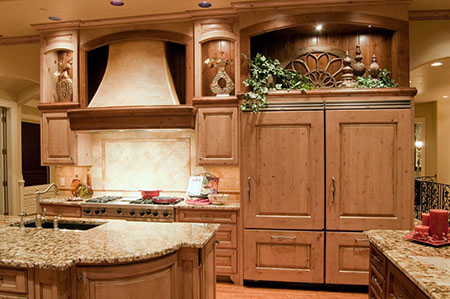Easy and Beautiful: Care and Maintenance of Your New Quartz Countertops
 Natural stone is a great choice in theory, but it doesn’t hold up to the hype in real life. Sleek, sophisticated marble and gorgeous, multi-coloured granite look wonderful, but the maintenance required to keep natural stone in shape is less than lovely. For starters, it has to be sealed. Over time, constant use will cause the sealant to wear away. When this happens, your natural stone will become more prone to staining. Drip a small amount of red wine or tomato sauce on a stone countertop and the ghost of that stain is likely to remain there forever.
Natural stone is a great choice in theory, but it doesn’t hold up to the hype in real life. Sleek, sophisticated marble and gorgeous, multi-coloured granite look wonderful, but the maintenance required to keep natural stone in shape is less than lovely. For starters, it has to be sealed. Over time, constant use will cause the sealant to wear away. When this happens, your natural stone will become more prone to staining. Drip a small amount of red wine or tomato sauce on a stone countertop and the ghost of that stain is likely to remain there forever.
Etching is also a concern, making homeowners nervous when they’re cooking with acidic ingredients such as lemon juice or vinegar. If an acidic spill is wiped up right away, it won’t cause any problems. However, if it goes unnoticed, the acid will eat into the surface and leave an unsightly mark that’s impossible to remove without professional treatment to the stone.
For this reason, many homeowners are now opting for beautiful quartz countertops in their kitchens and bathrooms. When you have a busy life—and especially if you have kids—you don’t have the energy to worry about protecting your counters from commonly-used food ingredients. You want something that’s strong, durable and easy to maintain. Quartz is the perfect low-maintenance countertop material for a kitchen that looks beautiful and is used constantly. A manmade, nonporous material, quartz is not absorbent. This means that you don’t have to agonize over every drip and spill, worrying that it will stain or damage your countertop.
Do you have kids that are active and energetic? Quartz can hold up to even the most frenetic household. It’s incredibly strong and won’t crack, chip, or scratch. It’s the perfect surface for kids to do homework, complete craft projects or simply play and hang out while they’re waiting to eat dinner. As strong as quartz may be, it is not 100% resistant to heat. As a result of this, it’s important to protect it from hot pans that have just been removed from a heat source such as the oven or stove. Failure to use a protective pad or trivet will result in scorch marks on your beautiful quartz countertop.
After dinner is over and all of the projects and fun have concluded, your quartz countertops will likely need to be scrubbed. The good news is that unlike with natural stone, you don’t need any specialized products to clean your quartz. Simply use some warm water with a few drops of dish detergent to remove daily dust and debris. For more in-depth cleaning, use a gentle multi-purpose cleaner. Avoid using steel wool or any abrasive scrubbing pads to clean quartz countertops. Similarly, don’t use harsh or abrasive chemical cleaners.
The reason that quartz is such a popular material for countertops is its good looks, durability and ease of cleaning and upkeep. By choosing quartz, you’ve picked a countertop that will last for years while requiring minimal attention—freeing you up for more important things.
- What to Consider when Buying Quartz Countertops
- Maintenance Tips for Quartz Countertops
- Is Quartz a Safe Material for Countertops?
- How To Get The Best Price On Quartz Countertops
- Estimating the Cost of Quartz Countertops
- Choosing Quartz Countertop Color
- Blue Quartz Countertops: What You Need To Know
- All You Need To Know About Quartz Tile Countertop
- Advantages of Installing Countertops Made Of Quartz
- How to Choose a Quartz Countertop
- Why Quartz Kitchen Countertops Are the New Trend
- Care and Cleaning of Your Quartz Countertops
- Are Quartz Countertops Right for Your Kitchen?
- 3 Reasons Why Quartz Kitchen Countertops Are Simply Better
- Why the Best Kitchen Countertops Are Made of Quartz
- Kitchen Countertops: Why Quartz Beats Granite Every Time
- Granite vs Quartz Countertops: Which Material is Best?
- Easy and Beautiful: Care and Maintenance of Your New Quartz Countertops

